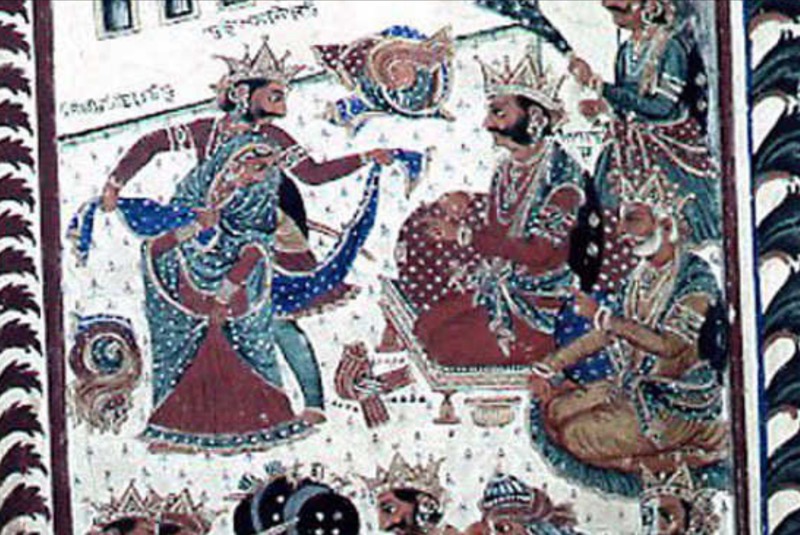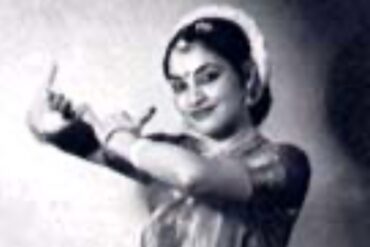If there is a woman hero in the Mahabharata, which has a surfeit of male heroes, it is Draupadi. She is a woman of rare courage and strength of character who challenges the existing order. Mahabharata war is Draupadi’s war. If it had not been for her courage and determination, she and her husbands would have ended up as slaves of Duryodhana. Yudhishtira treated her as property and wagered her away. The rest of them did nothing to stop him. When her honour was violated in the open court, her husbands and the elders of the clan kept silent, bowing to a patriarchal and misogynistic social and political order.
It was left to the victim to fend for herself. Her passionate plea for justice and her resourcefulness in the face of disaster ultimately bought freedom for herself and her husbands from a shamefaced Dhritarashtra. It was her unwavering resolve and sense of purpose that united her dejected husbands in the cause of avenging her humiliation and fighting for their rights.
Draupadi’s fight for justice happened five thousand years ago at the end of the Dwapara yuga. Nothing much seems to have changed since and even after 77 years of independence, and despite having one of the most progressive Constitutions in the world guaranteeing equal rights and protection, women are subjected to sexual harassment and discrimination daily in the country.
According to the National Crime Records Bureau, 51 cases of crime against women are registered every hour, and a woman is raped every 16 minutes. Most of the cases are quickly forgotten, and the culprits are never punished. A few cases, due to their extreme gruesomeness, managed to shake the nation’s conscience and have led to some positive steps towards strengthening the legal provisions for punishing the guilty. Yet, the conviction rate in crimes against women remains abysmally low at below 27 per cent.
The rape and murder of a 31-year-old doctor in Kolkata’s RG Kar Medical College Hospital on August 9 has convulsed the nation and once again brought to the fore the question of women’s safety in general and safety at the workplace in particular.
The initial wave of protests was led by women. Thousands of women joined the midnight marches all over the state on the night of 14-15 August with the slogan ’Reclaim the Night’, recalling ironically that midnight hour, when, in Nehru’s famous words, the country awoke to life and freedom.
Close on the heels of the RG Kar tragedy came the revelations of the Hema Committee Report in Kerala, bringing to light shocking tales of sexual harassment and discrimination in the Malayalam film industry. The report’s partial release on August 19 marked the culmination of a relentless struggle by some intrepid women.
The Women in Cinema Collective was formed in 2017 in the aftermath of the infamous case of abduction and sexual assault of a prominent woman actor in Kerala, a case in which a leading male actor of Malayalam cinema is the co-accused. The victim’s coming forward and doggedly pursuing the case against formidable odds is by itself a tale of great courage and strength of character. That the trial is yet to be concluded and the guilty yet to be punished is symptomatic of the prolonged agony and trauma victims of sexual violence are forced to undergo in their fight for justice.
While the male-dominated Malayalam film industry, by and large, remained hostile or apathetic, a group of women came out in support of the beleaguered victim and spoke out about the rampant sexual abuse, discrimination and exploitative working conditions in the industry. Their heroic struggle in the face of ridicule, ostracisation and denial of jobs compelled the authorities to set up the Hema Committee.
The all-woman committee’s report, which had been kept under wraps for four and a half years, saw the light of day after interventions by the State Information Commission and the High Court. The report’s revelations have let loose a veritable tsunami in the state, bringing down with it some of the powerful men in the Malayalam film world. More women are coming forward with more revelations, and more celluloid icons are likely to fall. Prosecution has already been launched against some of the accused with the prospect of impending arrests.
What this bunch of courageous women have achieved in Kerala is nothing short of a revolution. This is perhaps only the beginning, and the Hema Committee report is only the tip of the iceberg. Issues of women’s safety and equal rights can no longer be relegated to the background, and similar scrutiny in other sectors cannot be avoided.
Pitted against an entrenched, patriarchal social and political order, Indian women’s struggle for dignity and freedom from sexual harassment and exploitation has been long and often lonely. But for these struggles, what little strides the country has made towards gender justice and women’s safety would not have been possible.
It was Banwari Devi’s spirited crusade against her rapists with the support of a women’s organisation that led to the Supreme Court’s landmark Vishakha Guidelines for women’s safety at workplaces and the subsequent Sexual Harassment at Workplace (Prevention, Prohibition and Redressal) Act of 2013.
Women in India joined the global MeToo campaign in 2018 and made public several instances of sexual harassment involving some well-known personalities. These revelations and the resultant public outcry prompted further tightening of the legal provisions relating to sexual harassment.
Despite the sporadic awakenings of the public conscience, there is very little attention to the structural and attitudinal changes necessary for achieving gender justice and equality. Gender-based violence and discrimination are inherent in a patriarchal social and political system. It is for men, who are the guardians and beneficiaries of this system, to acknowledge the problem, yield space to women, and treat them as equal partners and stakeholders for progress.
As in the Kuru court, the men are on trial in today’s Bharat. It’s time they joined forces with their women in their fight to secure gender justice, equality and freedom from violence and harassment. Time to pledge to uphold women’s dignity and equality at home and outside. It is time to teach their sons to respect women and treat them as equals and that a No means No, even from the wife. It is their “MeToo” moment. They could start a “Maa Nishaada” campaign telling the predator within, “No, Hunter, No!”
-30-
Copyright©Madras Courier, All Rights Reserved. You may share using our article tools. Please don't cut articles from madrascourier.com and redistribute by email, post to the web, mobile phone or social media.Please send in your feed back and comments to [email protected]











